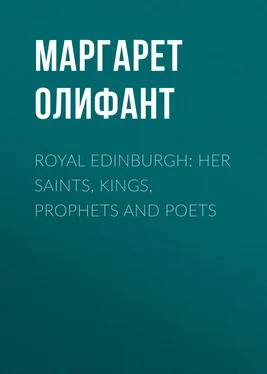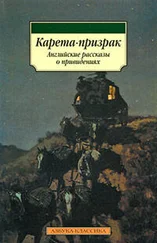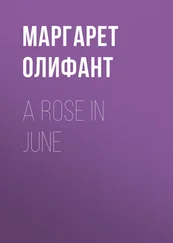Маргарет Олифант - Royal Edinburgh - Her Saints, Kings, Prophets and Poets
Здесь есть возможность читать онлайн «Маргарет Олифант - Royal Edinburgh - Her Saints, Kings, Prophets and Poets» — ознакомительный отрывок электронной книги совершенно бесплатно, а после прочтения отрывка купить полную версию. В некоторых случаях можно слушать аудио, скачать через торрент в формате fb2 и присутствует краткое содержание. Жанр: foreign_prose, История, literature_19, foreign_edu, foreign_antique, на английском языке. Описание произведения, (предисловие) а так же отзывы посетителей доступны на портале библиотеки ЛибКат.
- Название:Royal Edinburgh: Her Saints, Kings, Prophets and Poets
- Автор:
- Жанр:
- Год:неизвестен
- ISBN:нет данных
- Рейтинг книги:4 / 5. Голосов: 1
-
Избранное:Добавить в избранное
- Отзывы:
-
Ваша оценка:
- 80
- 1
- 2
- 3
- 4
- 5
Royal Edinburgh: Her Saints, Kings, Prophets and Poets: краткое содержание, описание и аннотация
Предлагаем к чтению аннотацию, описание, краткое содержание или предисловие (зависит от того, что написал сам автор книги «Royal Edinburgh: Her Saints, Kings, Prophets and Poets»). Если вы не нашли необходимую информацию о книге — напишите в комментариях, мы постараемся отыскать её.
Royal Edinburgh: Her Saints, Kings, Prophets and Poets — читать онлайн ознакомительный отрывок
Ниже представлен текст книги, разбитый по страницам. Система сохранения места последней прочитанной страницы, позволяет с удобством читать онлайн бесплатно книгу «Royal Edinburgh: Her Saints, Kings, Prophets and Poets», без необходимости каждый раз заново искать на чём Вы остановились. Поставьте закладку, и сможете в любой момент перейти на страницу, на которой закончили чтение.
Интервал:
Закладка:
It was in the reign of Marjory's son, the grandson and namesake of the Bruce, and of his successors, that Edinburgh began to be of importance in the country, slowly becoming visible by means of charters and privileges, and soon by records of Parliaments, laws made, and public acts proceeding from the growing city. Robert Bruce, though he had destroyed the castle, granted certain liberties and aids to the burghers, both in repression and in favour pursuing the same idea, with an evident desire to substitute the peaceful progress of the town for the dangerous domination of the fortress. Between that period and the reign of the second Stewart, King Robert III, the castle had already been re-erected and re-destroyed more than once. Its occupation by the English seemed the chief thing dreaded by the Scots, and it was again and again by English hands that the fortifications were restored—such a stronghold and point of defence being evidently of the first importance to invaders, while much less valuable as a means of defence. In the year 1385 the walls must have encircled a large area upon the summit of the rock, the enceinte probably widening, as the arts of architecture and fortification progressed, from the strong and grim eyrie on the edge of the precipice to the wide and noble enclosure, with room for a palace as well as a fortress, into which the great castles of England were growing. The last erection of these often-cast-down walls was made by Edward III on his raid into Scotland, and probably the royal founder of Windsor Castle had given to the enclosure an amplitude unknown before. The Scots king most likely had neither the money nor the habits which made a great royal residence desirable, especially in a spot so easily isolated and so open to attack; but he gave a charter to his burghers of Edinburgh authorising them to build houses within the castle walls, and to pass in and out freely without toll or due—a curious privilege, which must have made the castle a sort of imperium in imperio , a town within a town. The little closets of rooms which in a much later and more luxurious age must have sufficed for the royal personages whom fate drove into Edinburgh Castle as a residence, are enough to show how limited were the requirements in point of space of the royal Scots. The room in which James VI of Scotland was born would scarcely be occupied, save under protest, by a housemaid in our days. But indeed the Castle of Edinburgh was neither adapted nor intended for a royal residence. The abbey in the valley, from which the King could retire on receipt of evil tidings, where the winds were hushed and the air less keen, and gardens and pleasant hillsides accessible, and all the splendour of religious ceremonies within reach, afforded more fit and secure surroundings even for a primitive court. The Parliament met, however, within the fortress, and the courts of justice would seem to have been held within reach of its shelter. And thither the burghers carried their wealth, and built among the remains of the low huts of an earlier age their straight steep houses, with high pitched roofs tiled with slabs of stone, rising gray and strong within the enceinte , almost as strong and apt to resist whatever missiles were possible as the walls themselves, standing out with straight defiant gables against the northern blue.
King Robert III was a feeble, sickly, and poor-spirited king, and he had a prodigal son of that gay, brilliant, attractive, and impracticable kind which is so well known in fiction and romance, and, alas! also so familiar in common life. David, Duke of Rothesay, was the first in the Scotch records who was ever raised to that rank—nothing above the degree of Earl having been known in the north before the son and brother of the King, the latter by the fatal title of Albany, brought a new degree into the roll of nobility. Young David, all unknowing of the tragic fate before him, was then a daring and reckless youth, held within bounds, as would appear, by the influence of a good and wise mother, and if an anxiety and trouble, at least as yet no disgrace to the throne. He was the contemporary of another madcap prince, far better known to us, of whose pranks we are all more than indulgent, and whose name has the attraction of youth and wit and freedom and boundless humour to the reader still. David of Scotland has had no one to celebrate his youthful adventures like him whose large and splendid touch has made Prince Hal 1 1 We here take Shakspeare's Prince Hal for granted, as we feel disposed at all times to take the poet's word in defiance of history; though no doubt the historical argument is calculated to throw a chill of doubt upon that gay and brilliant image.
so fine a representative of all that is careless and gay in prodigal youth, with its noble qualities but half in abeyance, and abounding spirit and humour and reckless fancy making its course of wild adventure comprehensible even to the gravest. Perhaps the licence of the Stewart blood carried the hapless northern prince into more dangerous adventures than the wild fun of Gadshill and Eastcheap. And Prince David's future had already been compromised by certain sordid treacheries about his marriage when he first appears in history, without the force of character which changed Prince Hal into a conquering leader and strong sovereign, but with all the chivalrous instincts of a young knight. He had been appointed at a very early age Lieutenant of the Kingdom to replace his father, it being "well seen and kenned that our lorde the Kyng for sickness of his person may not travail to govern the realm," with full provision of counsellors for his help and guidance; which argues a certain confidence in his powers. But the cares of internal government were at this point interrupted by the more urgent necessity of repelling an invasion, a danger not unusual, yet naturally of an exciting kind.
On this occasion the invader was Henry IV of England, the father of the other prodigal, whose object is somewhat perplexing, and differs much from the usual raid to which the Scots were so well accustomed. So far as appears from all the authorities, his invasion was a sort of promenade of defiance or bravado, though it seems unlike the character of that astute prince to have undertaken so gratuitous a demonstration. He penetrated as far as Leith, and lay there for some time threatening, or appearing to threaten, Edinburgh Castle; but all that he seems to have done was to make proclamation by his knights and heralds in every town they passed through, of the old, always renewed, claim of allegiance to the English crown which every generation of Scots had so strenuously and passionately resisted. The fact that he was allowed to penetrate so far unmolested is as remarkable as that the invasion was an entirely peaceful one and harmed nobody. When Henry pitched his camp at Leith, Albany was within reach with what is called a great army, but did not advance a step to meet the invader—in face of whom, however, young David of Rothesay, and with him many potent personages, retired into Edinburgh Castle with every appearance of expecting a siege there. But when no sign of any such intention appeared or warlike movement of any kind, nothing but the gleam of Henry's spears, stationary day by day in the same place, and a strange tranquillity, which must have encouraged every kind of wondering rumour and alarm, the young Prince launched forth a challenge to the English king and host to meet him in person with two or three hundred knights on each side, and so to settle the question between them and save the spilling of Christian blood. Henry, it is said, replied with something of the sarcasm of a grave and middle-aged man to the hasty youth, regretting that Prince David should consider noble blood as less than Christian since he desired the effusion of one and not the other. The position of the young man shut up within the walls of the fortress in enforced inactivity while the hated Leopards of England fluttered in the fresh breezes from the Firth, and Henry's multitudinous tents shone in the northern sun—an army too great to be encountered by his garrison and noble attendants alone—while dark treason and evil intent in the person of Albany kept the army of Scotland inactive though within reach, was one to justify any such outbreak of impatience. David must have felt that should the invader press, there was little help to be expected from his uncle, and that he and his faction would look on not without pleasure to see the castle fall and the heir of Scotland taken or slain. But King Henry's object or meaning is more difficult to divine. Save for his proclamations, and the quite futile summons to King Robert to do homage, he seems to have attempted nothing against the country through which he was thus permitted to march unmolested. The little party of knights with their attendant squires and heralds riding to every market-cross upon the way, proclaiming to the astonished burghers or angry village folk the invader's manifesto, scarcely staying long enough to hear the fierce murmurs that arose—a passing pageant, a momentary excitement and no more—was a sort of defiant embassage which might have pleased the fancy of a young adventurer, but scarcely of a king so wary and experienced; and his own stay in the midst of the startled country is still more inexplicable. When the monks of Holyrood sent a mission to him to beg his protection, lying undefended as they did in the plain, his answer to them was curiously apologetic. "Far be it from me," he said, "to be so inhuman as to harm any holy house, especially Holyrood in which my father found a safe refuge.... I am myself half Scotch by the blood of the Comyns," added the invader. The account which Boece gives of the expedition altogether is amusing, and strictly in accord with all that is said by other historians, though they may not take the same amiable view. I quote from the quaint translation of Bellenden.
Читать дальшеИнтервал:
Закладка:
Похожие книги на «Royal Edinburgh: Her Saints, Kings, Prophets and Poets»
Представляем Вашему вниманию похожие книги на «Royal Edinburgh: Her Saints, Kings, Prophets and Poets» списком для выбора. Мы отобрали схожую по названию и смыслу литературу в надежде предоставить читателям больше вариантов отыскать новые, интересные, ещё непрочитанные произведения.
Обсуждение, отзывы о книге «Royal Edinburgh: Her Saints, Kings, Prophets and Poets» и просто собственные мнения читателей. Оставьте ваши комментарии, напишите, что Вы думаете о произведении, его смысле или главных героях. Укажите что конкретно понравилось, а что нет, и почему Вы так считаете.












